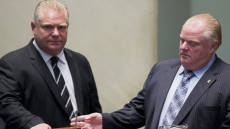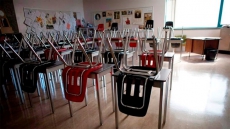VANCOUVER - With British Columbia's teachers' strike resolved, George Tso is shifting from stress to school-mode after three weeks using tutors and attempting to teach himself curriculum that will pave his way to university.
When the 15-year-old enters Grade 11 at Steveston-London Secondary School on Monday, he won't be harbouring any negative feelings towards his teachers or the government.
"I'm a very forgiving person," said Tso, but noted the sentiment will likely be different amongst his friends.
"I have this feeling that when I go back to school, a lot of them — or, those who like school — are going to be, like, 'That was such a waste of my September.'"
Public school teachers will trade pickets for pencils across the province next week after ratifying a new collective agreement on Thursday. Eight six per cent of the 31,741 union members who voted approved the deal.
But the question weighs on many about whether the months-long conflict, spanning two school years and affecting half a million students, their families, more than 40,000 teachers and resulting in a variety of social and economic spin-offs, was worth it.

What impact will the longest education strike in provincial history have on relations between the B.C. Teachers' Federation and the provincial government?
"It's just been one more chapter at the end of this long and acrimonious history," said Tom Fleming, University of Victoria professor emeritus and author of "Worlds Apart," which tells the story of 140 years of the B.C. school system.
Fleming, who was editor-in-chief and one of six research directors for a Royal Commission on Education in 1987-1988, said he's long concluded that the teachers' union and the government are simply large organizations dedicated to preserving the status quo.
"I really see nothing in the outcome of this strike that causes me to believe differently."
Still, Fleming isn't entirely pessimistic, noting that the six-year negotiated contract does equate to a reset button being hit.

"Neither side got exactly what they wanted, and that's probably a good thing," he said, musing over how people will be able to determine whether anyone is better off after the ordeal.
"Take some of this demonization out of it — that government is the enemy of public schooling and the teachers are looters of the public treasury. Until that gets all together eliminated, I don't think we're going to really have people who can sit across the table from one another."
Education Minister Peter Fassbender said in an interview Friday that he hopes the relationship between teachers and the province can be healed over the next five years of labour peace. Union president Jim Iker has also expressed a desire for more cordial relations.
Whether the conversation actually shifts will be the test, say experts like Tom Knight, an industrial relations professor at the University of British Columbia.
"If (Premier) Christy Clark can be taken at her word, that now (she is) squarely focused on education ... then maybe the whole experience is going to open the door to them," he said. "And if the teachers are taken at their word, that's what it's been all about all along."

Business Prof. Fiona McQuarrie, at the University of the Fraser Valley, said teachers came out with less than they got back in their new contract, but there are silver linings.
"I think the union gained more support than they had in the past," she said. "Also, people not involved in the school system are more aware of issues in classrooms with special needs students."
Teacher Tara Ehrcke, contract chairwoman for the Greater Victoria Teachers Association, vocally opposed the contract. But she said it's always worth it to contest injustice.
"I think teachers have seen that injustice in terms of how chronic under funding impacts children living in poverty, children with learning disabilities, children with physical disabilities," she said.
"I feel very, very proud to be a member of a profession who is willing to take personal sacrifice to stand up and try and change those things."

Students will go back to school Monday or Tuesday, with the decision being made by individual school districts.





